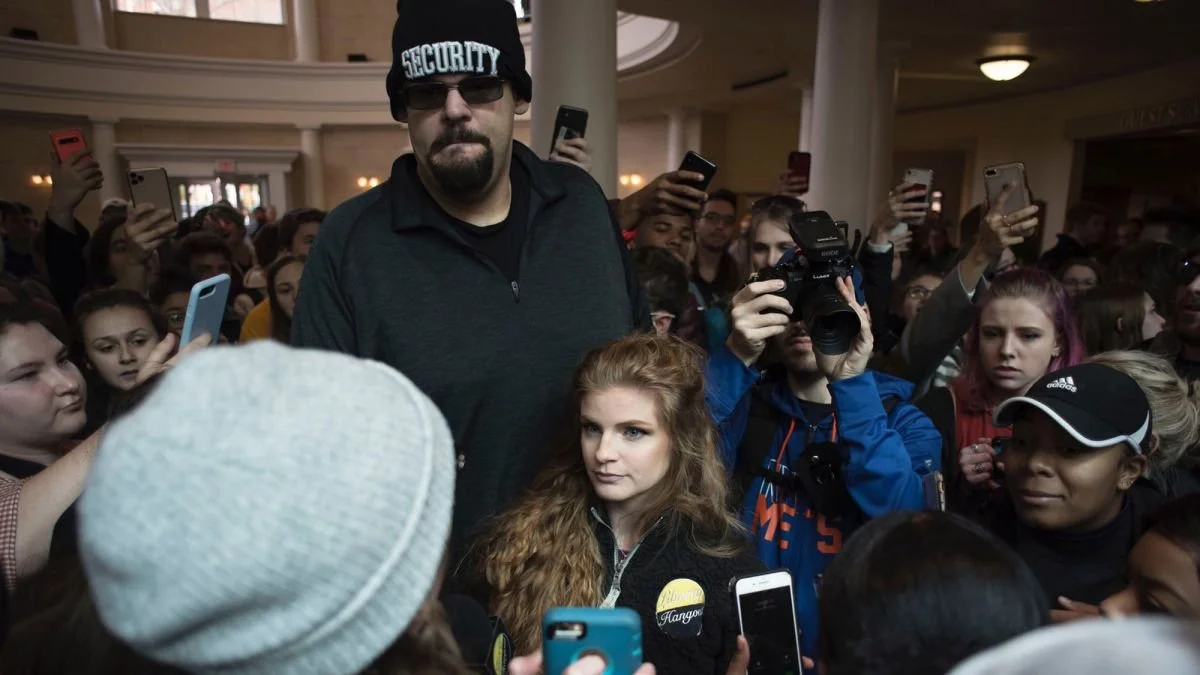OPINION: Let’s bring debate back to campus
“Gun rights activist Kaitlin Bennett at Ohio University Baker University Center on Feb. 17, 2020,” photo by Gabriela Gabennesch.
Zach Donaldson is a sophomore studying political science and an opinion writer for The New Political.
Please note that these views and opinions do not reflect those of The New Political.
This past spring, Gov. Mike DeWine signed Ohio Senate Bill 135, requiring state universities to prescribe free speech policies on campuses. The bill creates a new, enforced process that allows students and faculty to appeal if they feel their rights under said policies were violated.
The bill is a continuation of the administration’s effort to protect political expression on campus following Gov. DeWine’s signing of Ohio Senate Bill 40 in December 2020, which prohibited misleadingly labeled “free speech zones” and expanded outdoor areas of campus as public forums.
I detest most of what Gov. DeWine and the Ohio Republican Caucus have said in their time in office, but I affirm their right to say it. I’m glad this bill indicates the sentiment is mutual.
Over the past decade, fake activism rooted in a blistering hostility toward dissent and rejection of opposing ideas has become a trend at some of the world’s most prestigious universities. Students at Brown shouted down a lecture by NYPD Commissioner Ray Kelly before it could begin. A professor at Yale was coerced into leaving after suggesting students didn’t need lecturing on appropriate Halloween costumes. This year, Dartmouth moved a lecture online led by conservative columnist Andy Ngo over safety concerns despite the absence of protesters. 69% of Harvard students aren’t willing to call it unacceptable to shut down a speaker on campus.
I have had countless private conversations with students who are scared to express any idea outside the dominant views on campus for fear of isolation or retribution. I often hear disgust and distaste about friendships or relationships that cross political lines.
All of these efforts are in direct contrast to the most paramount virtue of the university system: To educate. Education is not about being comfortable and avoiding offense. Education is about being challenged to think.
Giving divisive pundits, academics or celebrities a chance to speak is not “giving them a platform.” Ben Shapiro, Jordan Peterson and Kaitlin Bennett already have enormous platforms. Protestors often cite these individuals' reputations for promoting racist or classist views as grounds for removal.
While I attest and sympathize with those noble goals, I seriously question if stonewalling them is the best means to do it. Many of the views and candidates so widely maligned by most college students are supported by nearly half of the country. Are we willing to write off such a major portion of the population as unambiguous bigots, or should we take the challenge of rising above and dissecting ideologies we dislike head-on? I think the latter unequivocally achieves more. I am under no illusion that everyone will listen, but some will - and that is a good place to start.
Ignoring their existence and avoiding contact strengthens their cause. It feeds and proves a narrative that they are being censored and allows them to promote their agenda without any intellectual backlash.
Engagement and provocation with even the most controversial views promote good thinking. It allows one to consider their faults and have a facilitated discussion where cooler heads prevail. It fosters a sense of intellectual accountability and maturity, something sorely lacking in the political atmosphere of many college campuses right now. Nobody loses when you have a conversation.
One bill alone will not change the culture of discourse on college campuses, but it is heartening to see liberals and conservatives endorse a bill allowing them to learn from each other. After all, isn’t that what education is all about?

